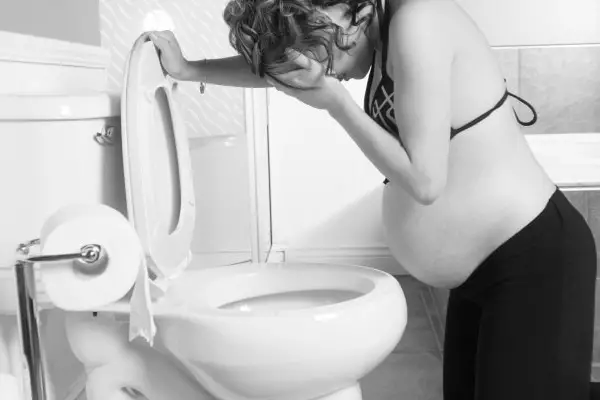Are you pregnant with your first baby? Isn’t experiencing nausea part of the pregnancy? This article will explain each and every detail of your pregnancy so you will not have to second guess yourself anymore. We will also be covering the topic at hand, how long nausea occurs before labor, in extreme depth. This topic will help you prepare yourself for the difficulties to come.
Pregnancy causes nausea during the first trimester as the body copes with extreme hormonal changes. This process of experiencing nausea starts again in the third trimester as your body starts preparing for the baby to come. It makes a path for the baby by clearing anything in your stomach, which leads to the changing of bowel movements for many women. This process either causes diarrhea or puking. You may feel nauseous a few weeks before the real labor begins.
Can You Feel Nauseous Days Before Labor?
The last few weeks before your labor begins, feeling nauseous is entirely normal. It displays itself in the early stages of labor. The labor probably won’t start for another few days, so stay calm and relax. There are a few reasons why you might feel nauseous before labor. These are listed below:
- As the baby grows, you will feel pressure on your digestive system. This pressure is because the body automatically slows down so the baby can get nutrients from the food that you consume. Due to this, you may experience nausea or heartburn.
- Your endometrium, or uterine layer, thickens, which causes hormonal changes to take place in your body. These changes cause nausea and vomiting.
- Taking vitamins high in iron can lead to nausea, too. It’s best to stick to one brand of vitamins as changing brands can cause you nausea as well.
If you are feeling nauseous before your 37th week, it may mean you are experiencing preterm labor.
How Do You Feel 24 Hours Before Labor?
Is your gut telling you to prepare for labor? Has the baby secretly whispered that it’s ready to come out? Is this your first child? Don’t worry. You may feel a little nauseous or sick, but it’s common. We have included some significant signs of labor. These include:
- Nesting: While it might seem rational since you are beyond exhausted, sometimes pregnancy causes bursts of energy. This bubble of energy means that right before labor, many women experience the urge to clean and organize the baby’s clothes. They obsess and panic over minor details like cleaning the house or decorating the baby’s nursery or painting each wall of the house. Some may even try setting up their hospital bags neatly and perfectly. Again, this excitement or panic is a normal feeling.
- Contractions: You will go through some high-intensity, regular contractions with short intervals in between. These evenly spaced contractions mean that labor is likely to begin within a day or two. Beware! Do not confuse your labor contractions with Braxton-Hicks contractions. Braxton-Hicks contractions are also called practice contractions as these are irregular contractions and aren’t painful. These are false labor signs as your body is prepping you up for true labor. They mostly feel like period pains. Take note of your labor contractions. If they are painful and regular, then that means this isn’t a false alarm, and these aren’t Braxton-Hicks contractions. Hurry to your doctor—it’s likely that labor is starting!
- Loosening Joints: At the end of your pregnancy, the hormone relaxin is released more than usual to loosen the joints and ligaments and make delivery easier. You will feel your joints become much more relaxed than usual. This hormone helps in making a path for your baby to come into the world.
- Diarrhea: Before labor, you may feel the need to use the bathroom constantly. This feeling occurs because when your body produces relaxin, it also relaxes the rectal muscle. The pregnancy hormone clears out the contents of your stomach in the form of loose stools. Do not forget to drink lots of water to stay hydrated. Diarrhea is a significant sign of impending labor.
- Backaches: As you near the end of your pregnancy, back pain becomes intense. This pain travels from the lower back to your legs and the pelvic area. This pain occurs because once the baby drops, you have to change your posture and bend, too. Your muscles and tissues stretch to make room for the baby. It gets more uncomfortable as the baby gets heavier. Unfortunately, the pain remains through labor and sometimes sticks around, even after delivering the new baby.
Every mother experiences different feelings before their baby’s arrival. It’s hard to determine if you will feel all of these symptoms or just a few. Either way, we hope you have a safe and painless delivery.
What Signs Did You Have Before You Went Into Labor?

Each woman experiences a variety of signs leading up to labor. These signs are broken down into three stages, and we are going to discuss them all in detail.
The First Stage
This occurs weeks before true labor. You may experience a few of these early signs:
- Flu-like symptoms. You may have a runny nose, sore throat, slight cough, or sneezing. This can be the first sign your body gives to let you know the baby is days from delivery. Feeling nauseous and exhausted is another sign of labor.
- Slight back pain is another early sign that the pregnancy will soon be ending.
These are early signs of labor, so there is still some time before you will welcome the baby into your arms.
The Second Stage
These signs of labor may happen a few days before the actual due date or even a day or two before delivery:
- Baby Drops
Your baby will drop at the end of your third trimester. The dropping of the baby means that the baby gets settled into your lower pelvic area, head down, ready to make an exit at any time. This drop is called “lightning”. This process helps the mom breathe a little easier as the baby moves away from the diaphragm and towards the lower portion of the womb.
- Water Breaks
Your baby floats inside a sac filled with amniotic fluid. When your baby’s head puts pressure on it, the amniotic sac ruptures and the fluid flows out. This means that your water breaks and the baby might be ready to come into the outside world within 24 hours. Water breaking doesn’t always happen the way it is dramatically portrayed on TV; it might result in only a few spots or trickles of amniotic fluid in the underwear.
- Mucus Plug
The mucus plug works like a cork for your cervix. It protects the unborn from the outside world as well as infections. When your cervix begins to dilate, the plug in your body discharges. The plug either dislodges as a stain or a blob. Either way, it is best to keep a check on the state of your mucus plug, as once it’s out, the infant in your womb is no longer immune to infections.
When the plug pops out, the veins at your cervix also break, causing brown or pinkish blood to leak. The leaking of blood is called a bloody show. If the blood is a deep red color or you lose a large amount of blood from your vagina, you should waste no time and contact your healthcare provider to inform them of the situation.
- Contractions
Contractions are among the early signs of true labor. They show that the body is getting ready for delivery. Contractions start off mild and may come and go over time.
- Cervix Dilation:
As the baby is getting ready to say hello to the world, your cervix begins to dilate and efface. This means the cervix opens up to about ten centimeters, so a birth canal is formed, and the infant can leave the womb. Once fully dilated, delivery is near.
If your cervix begins dilating and effacing before 34 weeks, it is a sign of early labor. Your healthcare provider will advise and assist you. Going into early labor isn’t always dangerous, but you must inform your doctor so they can treat you and your baby appropriately.
The Last Stage
The signs of this stage are quite clear and indicate that the labor is just a few hours away.
- Strong Contractions
When you go through powerful and painful contractions at regular time intervals, it means labor has truly begun.
If you cannot walk or talk through the actual contractions, your baby is definitely on the way. These contractions can occur in both your abdomen and back.
- Water Breaks
If it didn’t happen in stage two, it might happen on the day of your labor or a few hours before it.
- Nesting Instinct
This is the sudden urge to clean and organize your baby’s room or your own room. Most women experience these random bursts of energy, when they feel they need to get the house squeaky clean or perfectly set up for the child. If you are having these thoughts yourself, hold your horses! There will be plenty of time to do all that once the newborn comes home.
These signs may differ from woman to woman, as there is no hard and fast rule about pregnancies. Each woman has their own experiences, so it would be wrong to compare yourself to somebody else.
How Do You Feel 2 Days Before Labor?
Pregnancy and labor are unique experiences for every mom-to-be. No one feels or experiences it in exactly the same way. Some of the common signs of labor just two days before it are often the ones shared below:
- Loose Stools: One thing many moms-to-be experience near the end of their third trimester is diarrhea. This is caused due to the relaxing of muscles. This causes the rectal muscle to loosen and empty your stomach.
- Frequent Urination: You may want to go to the bathroom all the time right before your labor. This happens because, before labor, the child’s head positions itself at the lower abdomen which puts pressure on your bladder, and the urge to pee continues.
- Back Pain: Right before labor, moms tend to feel pain in their backs. This continues even after the delivery sometimes.
- Nesting: Nesting means that the mom-to-be has a sudden urge to clean and organize everything to perfection. Experiencing vigor and energy is another sign of labor. This means that the mother is ready to go for delivery and labor is near. It may take less than 24 hours before labor begins.
So What’s The Bottom Line?
To end this, we would once again like to remind all the new moms-to-be to relax and rest as much as possible. Once your newborn pops out, you won’t be getting much sleep anytime soon!
We would also like for you to know that the signs we mentioned are all normal, so you don’t need to worry. However, if you feel something isn’t right, it is advised that you contact your healthcare provider and inform them of the situation. As they say, “It’s better to be safe than sorry.”
Giving birth is a challenging task, but you will surely do great. Even if there are ups and downs along this journey, remember that everything is going to be okay.

